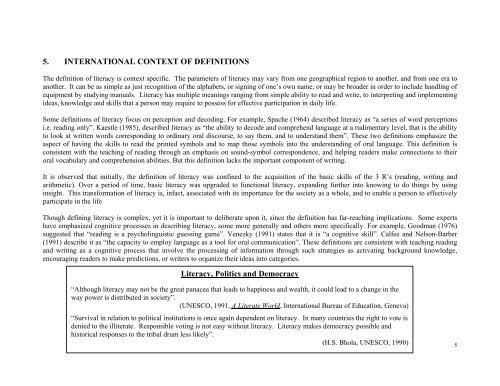Literacy Trends in Pakistan - UNESCO Islamabad
Literacy Trends in Pakistan - UNESCO Islamabad
Literacy Trends in Pakistan - UNESCO Islamabad
You also want an ePaper? Increase the reach of your titles
YUMPU automatically turns print PDFs into web optimized ePapers that Google loves.
5. INTERNATIONAL CONTEXT OF DEFINITIONSThe def<strong>in</strong>ition of literacy is context specific. The parameters of literacy may vary from one geographical region to another, and from one era toanother. It can be as simple as just recognition of the alphabets, or sign<strong>in</strong>g of one’s own name, or may be broader <strong>in</strong> order to <strong>in</strong>clude handl<strong>in</strong>g ofequipment by study<strong>in</strong>g manuals. <strong>Literacy</strong> has multiple mean<strong>in</strong>gs rang<strong>in</strong>g from simple ability to read and write, to <strong>in</strong>terpret<strong>in</strong>g and implement<strong>in</strong>gideas, knowledge and skills that a person may require to possess for effective participation <strong>in</strong> daily life.Some def<strong>in</strong>itions of literacy focus on perception and decod<strong>in</strong>g. For example, Spache (1964) described literacy as “a series of word perceptionsi.e. read<strong>in</strong>g only”. Kaestle (1985), described literacy as “the ability to decode and comprehend language at a rudimentary level, that is the abilityto look at written words correspond<strong>in</strong>g to ord<strong>in</strong>ary oral discourse, to say them, and to understand them”. These two def<strong>in</strong>itions emphasize theaspect of hav<strong>in</strong>g the skills to read the pr<strong>in</strong>ted symbols and to map those symbols <strong>in</strong>to the understand<strong>in</strong>g of oral language. This def<strong>in</strong>ition isconsistent with the teach<strong>in</strong>g of read<strong>in</strong>g through an emphasis on sound-symbol correspondence, and help<strong>in</strong>g readers make connections to theiroral vocabulary and comprehension abilities. But this def<strong>in</strong>ition lacks the important component of writ<strong>in</strong>g.It is observed that <strong>in</strong>itially, the def<strong>in</strong>ition of literacy was conf<strong>in</strong>ed to the acquisition of the basic skills of the 3 R’s (read<strong>in</strong>g, writ<strong>in</strong>g andarithmetic). Over a period of time, basic literacy was upgraded to functional literacy, expand<strong>in</strong>g further <strong>in</strong>to know<strong>in</strong>g to do th<strong>in</strong>gs by us<strong>in</strong>g<strong>in</strong>sight. This transformation of literacy is, <strong>in</strong>fact, associated with its importance for the society as a whole, and to enable a person to effectivelyparticipate <strong>in</strong> the lifeThough def<strong>in</strong><strong>in</strong>g literacy is complex, yet it is important to deliberate upon it, s<strong>in</strong>ce the def<strong>in</strong>ition has far-reach<strong>in</strong>g implications. Some expertshave emphasized cognitive processes <strong>in</strong> describ<strong>in</strong>g literacy, some more generally and others more specifically. For example, Goodman (1976)suggested that “read<strong>in</strong>g is a psychol<strong>in</strong>guistic guess<strong>in</strong>g game”. Venezky (1991) states that it is “a cognitive skill”. Calfee and Nelson-Barber(1991) describe it as “the capacity to employ language as a tool for oral communication”. These def<strong>in</strong>itions are consistent with teach<strong>in</strong>g read<strong>in</strong>gand writ<strong>in</strong>g as a cognitive process that <strong>in</strong>volve the process<strong>in</strong>g of <strong>in</strong>formation through such strategies as activat<strong>in</strong>g background knowledge,encourag<strong>in</strong>g readers to make predictions, or writers to organize their ideas <strong>in</strong>to categories.<strong>Literacy</strong>, Politics and Democracy“Although literacy may not be the great panacea that leads to happ<strong>in</strong>ess and wealth, it could lead to a change <strong>in</strong> theway power is distributed <strong>in</strong> society”.(<strong>UNESCO</strong>, 1991, A Literate World, International Bureau of Education, Geneva)“Survival <strong>in</strong> relation to political <strong>in</strong>stitutions is once aga<strong>in</strong> dependent on literacy. In many countries the right to vote isdenied to the illiterate. Responsible vot<strong>in</strong>g is not easy without literacy. <strong>Literacy</strong> makes democracy possible andhistorical responses to the tribal drum less likely”.(H.S. Bhola, <strong>UNESCO</strong>, 1990)5
















